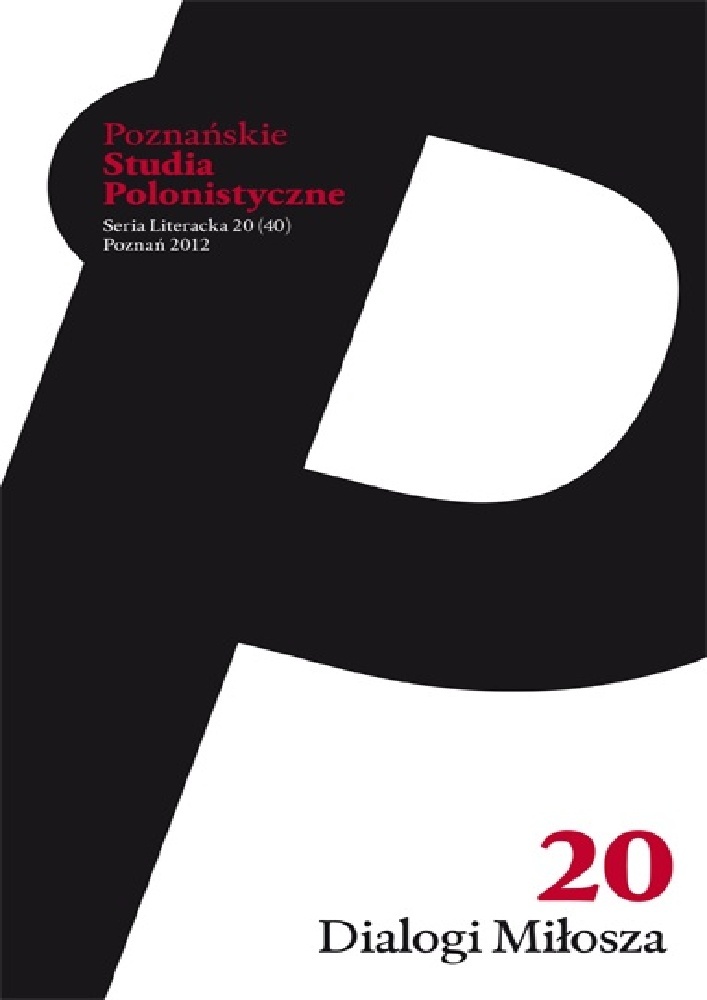Abstract
The article discusses Miłosz’s poetic strategies of expression in problems of the body, illness, getting old, and the impending death. Those problems are closely related to Miłosz’s personal experience. The autobiographical plane adds dramatism to Miłosz’s experiments in developing a new poetic language in his old age. Especially in Farther Surroundings seems to develop a new poetical diction in the epistemological sense. The dark tone of the poet is still present, but it gradually weakens and is replaced by words that unambiguously praise (perhaps overpraise) existence, and so reveal their (self)persuasive quality. In this perspective the profusion of texts, which Miłosz wrote in his last years, is evidence of not only of an impressive intellectual power, but also of a drama that was covered by an overload of words.
References
Fiut A., Moment wieczny. Poezja Czesława Miłosza, Kraków 2011.
Jarniewicz J., Dlaczego Miłosz nie lubi Larkina?, w: Poznawanie Miłosza 3. 1999–2010, red. A. Fiut, Kraków 2011.
Miłosz C., Degradacja, w: Druga przestrzeń, Kraków 2002.
Miłosz C., Do poety Roberta Lowella, w: To, Kraków 2000.
Miłosz C., Hymn o Perle, w: Wiersze, t. 2, Kraków–Wrocław 1984.
Miłosz C., Kroniki, Kraków 1988.
Miłosz C., Na brzegu rzeki, Kraków 1994.
Miłosz C., Nieobjęta ziemia, Kraków 1988.
Miłosz C., Nie rozumiem, w: To, Kraków 2000.
Miłosz C., Notatnik, w: Druga przestrzeń, Kraków 2002.
Miłosz C., Oczy, w: Druga przestrzeń, Kraków 2002.
Miłosz C., Ogród nauk, Lublin 1991.
Miłosz C., O nierówności ludzi, w: To, Kraków 2000.
Miłosz C., Oset, pokrzywa, w: Dalsze okolice, Kraków 1991.
Miłosz C., Rodowód, w: Kroniki, Kraków 1988.
Miłosz C., Sześć wykładów wierszem (Wykład VI), w: Kroniki, Kraków 1988.
Miłosz C., To, w: To, Kraków 2000.
Miłosz C., To jasne, w: To, Kraków 2000.
Miłosz C., To jedno, w: Kroniki, Kraków 1988.
Miłosz C., Traktat moralny, w: Wiersze, t. 1, Kraków–Wrocław 1984.
Miłosz C., Trytony (1913–1923), w: Kroniki, Kraków 1988.
Miłosz C., Tytanik (1912), w: Kroniki, Kraków 1988.
Miłosz C., Wiek nowy, w: Druga przestrzeń, Kraków 2002.
Miłosz C., Wstęp, w: Kroniki, Kraków 1988.
Miłosz C., Wstydzę się, w: Wiersze ostatnie, Kraków 2006.
Pawelec D., Treny, w: Poznawanie Miłosza 3. 1999–2010, red. A. Fiut, Kraków 2011.
Skrendo A., Starzy poeci i nowa rzeczywistość — Miłosz i nie tylko, w: Poznawanie Miłosza 3. 1999–2010, red. A. Fiut, Kraków 2011.
Stankowska A., Spowiedź poety, „Res Publica Nowa” 2000, nr 11.
Zaleski M., Zamiast, Kraków 2005.
License
Authors
Authors of texts accepted for publication in „Poznańskie Studia Polonistyczne. Seria Literacka” are required to complete, sign and return to the editor's office the Agreement for granting a royalty-free license to works with a commitment to grant a CC sub-license.
Under the agreement, the authors of texts published in „Poznańskie Studia Polonistyczne. Seria Literacka” grant the Adam Mickiewicz University in Poznań a non-exclusive, royalty-free license and authorize the use of Attribution-NoDerivatives 4.0 International (CC BY-ND 4.0)Creative Commons sub-license.
The authors retain the right to continue the free disposal of the work.
Users
Interested Internet users are entitled to use works published in „Poznańskie Studia Polonistyczne. Seria Literacka” since 2016, for non-commercial purposes only, under the following conditions:
- attribution - obligation to provide, together with the distributed work, information about the authorship, title, source (link to the original work, DOI) and the license itself.
- no derivatives - the work must be preserved in its original form, without the author's consent it is not possible to distribute the modified work, such as translations, publications, etc.
Copyrights are reserved for all texts published before 2016.
Miscellaneous
Adam Mickiewicz University in Poznań retains the right to magazines as a whole (layout, graphic form, title, cover design, logo etc.).
